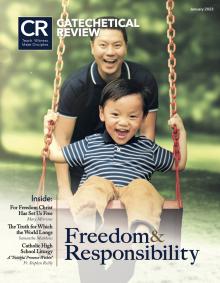Diego is eleven years old. For years he has received religious formation through the Catechesis of the Good Shepherd (CGS) in a carefully prepared environment for the religious life of children called an atrium. He is working with a material known as the “Unity and Vastness of the Kingdom of God,” a timeline that takes a long and essential view of the history of salvation. Diego ponders the moment in this history when God says, “Let us make humankind in our image and likeness” (Gen 1:26). The catechist asks: “What do you think that means?” Diego never answers immediately. After a few minutes, he says, “It means we are able to live the Maxims.” Then, he brings over the box of “The Maxims of Jesus.”[1] This material consists of twelve wooden tablets, each holding a scripture verse of Jesus’ moral announcements. Under the words of Genesis, he places some of these Maxims:
- “. . . be perfect, just as your heavenly Father is perfect.” (Mt 5:48)
- “I give you a new commandment: love one another as I have loved you” (Jn 13:34)
- “You shall love your neighbor as yourself.” (Mt 22:39)
While Diego has not yet studied the Catechism of the Catholic Church, he is living what it teaches: “Freedom is exercised in relationships between human beings. Every human person, created in the image of God, has the natural right to be recognized as a free and responsible being. All owe to each other this duty of respect. The right to the exercise of freedom, especially in moral and religious matters, is an inalienable requirement of the dignity of the human person” (CCC 1738).
In the atrium, Diego is “recognized as a free and responsible being” and is given the time and the space needed for him to exercise that freedom. It is his response to being called by name by his Good Shepherd, Jesus Christ, who “loves you; he gave his life to save you; and he is now living at your side every day to enlighten, strengthen and free you.”[2]
[1] The Maxims of Jesus are key announcements from Jesus found in the New Testament that provide guidance on living in relationship with God.
[2] Francis, Evangelii Gaudium, no. 164.
The rest of this online article is available for current Guild members.
This article is from The Catechetical Review (Online Edition ISSN 2379-6324) and may be copied for catechetical purposes only. It may not be reprinted in another published work without the permission of The Catechetical Review by contacting [email protected]

















